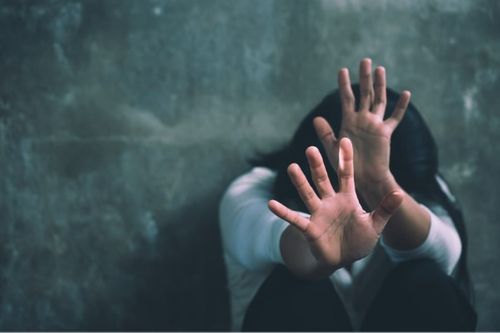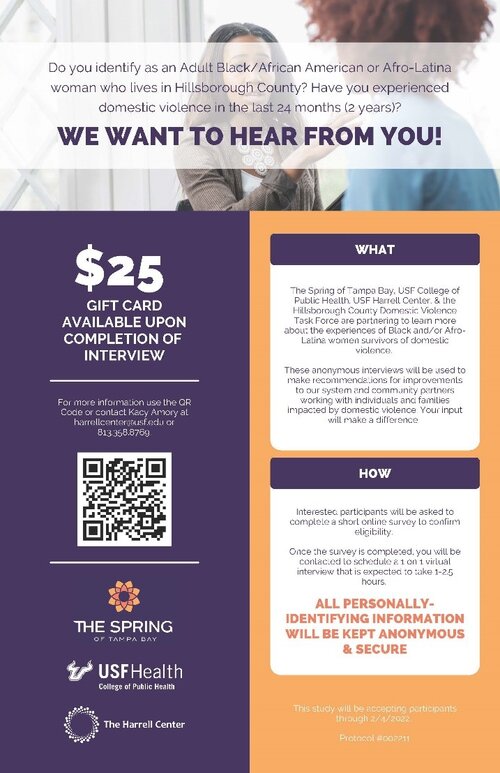Giving a voice to survivors of domestic violence
October is Domestic Violence Awareness Month
The USF College of Public Health Harrell Center for the Study of Family Violence is working in collaboration with the Spring of Tampa Bay and the Hillsborough County Domestic Violence Task Force to learn more about the experiences of Black and Afro-Latina women survivors of domestic violence in Hillsborough County, Fla.
The project, called the “Listening Sessions Project,” aims to understand how Black and Afro-Latina women perceive and experience various aspects of the justice system after experiencing domestic violence, according to Dr. Abraham Salinas Miranda, USF COPH assistant professor and director of the Harrell Center.
“Is the domestic violence services experience the same for Black women or Afro-Latinas compared to White women or is it different? By services, we mean criminal justice services and other victim assistance services. We need to investigate any differential treatment or responses with the aim of improving racial equity,” Salinas Miranda said.
The project is conducted in two parts, according to Kacy Amory, project coordinator and USF PhD criminology student who is also serving as a graduate research assistant in the Harrell Center.
The first part consists of an initial survey with questions about their experiences which leads into structured virtual interviews gauging their experiences and recommendations.
Eligible participants must identify as a Black or Afro-Latina woman who has experienced domestic violence in the last 24 months and is a resident of Hillsborough County with access to e-mail and internet.
All participant information will remain confidential, but will come with big impact, according to Amory.
“By sharing their experiences, they’re able to have a direct impact. They are giving their experiences in a way in which they can be directed into recommendations for changes in the system that can also be beneficial for future women who are going through the same circumstances that they did,” Amory said.

“We know that the domestic violence is part of a spectrum of interpersonal violence. When you find domestic violence, you find child maltreatment and other forms of violence. But, underlying the violence are the social determinants of health,” Salinas Miranda said. “There are studies that suggest that providers perceive African-American women in a different way. For instance, they may be less likely to be addressed with a trauma-informed lens and that is systemic racism and discrimination.”
Salinas Miranda also says that “in our county, we are very fortunate that service providers have identified advancing racial equity in domestic violence services as a key goal for our system of care.”
The Spring of Tampa Bay, a certified domestic violence center for Hillsborough County providing services such as a hotline, emergency housing, case management, prevention programs, and legal advocacy is helping to inform women of the option to take part in this project.

According to Florida Department of Law Enforcement, there were 7,083 domestic violence offenses in Hillsborough County in 2020.
Jen Shtab, coordinated community response trainer for the Spring of Tampa Bay, says the Listening Sessions Project will help get a better understanding of what is happening more locally.
Shtab said she hopes this project exemplifies a commitment toward making changes at the systems level so that all entities can be more responsive to survivors of domestic violence in Hillsborough County.
“The hope is that recommendations will come out of it and that we can begin implementing those recommendations to make changes so that we have a more equitable criminal justice response and more accessible services for women of color who are survivors of domestic violence,” she said.
To learn more about the Listening Sessions Project, visit the Harrell Center website.
Related media:
Lifeline | The Spring of Tampa Bay [Video]
Lifeline | Victim Assistance and Victim Compensation [Video]
LifeLine | Understanding Injunction for Protection [Video]
Story by Anna Mayor, USF College of Public Health
